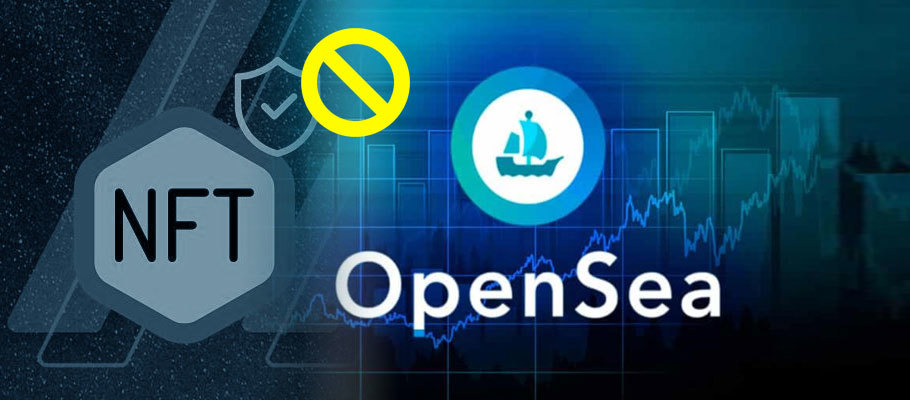
Published: August 24th, 2022
Ex-OpenSea product manager Nate Chastain is seeking to have the insider trading charges against him dismissed by arguing that NFTs don’t meet the definition of a security or commodity.
If judges accept the motion filed by his lawyers last Friday (19 August), it will mean that no crime was committed when he allegedly made trades based on insider knowledge of which collections were going to be promoted.
Chastain is accused of abusing his position at the company, which included selecting which NFTs would be featured by OpenSea on its homepage. In charges laid by the US Department of Justice (DoJ) and FBI, its alleged that Chastain bought NFTs he knew would be promoted, and then sold them for up to five times what he’d paid.
When amateur sleuths on social media called out what appeared to be dodgy transactions tied to Chastain, OpenSea investigated and Chastain was forced to resign.
OpenSea is the world’s number one marketplace for non-fungible tokens (NFTs), which are unique digital representations of content like art or music. They provide proof of ownership and enable physical works of art to be traded virtually online.
In his filing to have the charges dismissed, Chastain’s lawyers say the authorities are alleging that Chastain acted ‘with criminal intent to exploit his inside knowledge of which NFTs would be featured on OpenSea’s homepage.’ Chastain, they say, bought certain NFTs before they were featured and then sold them at a multiple of their original price after they were featured.
‘The truth, however, is that the NFTs can’t be classified as securities or commodities’ under current definitions.
Chastain’s case is worth watching as it’s the first insider trading case ever brought for in the US illegal trading of digital assets. American securities law defines insider trading as using confidential information to make lucrative financial trades.
Chastain allegedly abused his position by making NFT purchases that he knew would be listed and promoted later, enabling him to sell them for ‘two- to five-times the original price’.
To conceal the transactions, DoJ investigators say he used anonymous crypto wallets and accounts.
The charges against Chastain carry a maximum sentence of 20 years in jail, each.
Does Chastain have a legal leg to stand on?
Jan Hammer, a lawyer with blockchain legal specialists, DLT, told Forbes that ‘It’s almost impossible to claim across the board that NFTs aren’t securities’.
‘As pieces of code on a blockchain linked to underlying assets, NFTs may not qualify as securities in and of themselves. However, the way they were marketed to prospective buyers could affect their classification, meaning an NFT sale could qualify as a security offering and make it subject to financial services law.’
Although the DOJ’s press release calls the charges insider trading, crypto legal analyst David told Bloomberg that the case is different from other instances of insider trading. Instead of dealing with publicly-traded securities, which is normally what insider trading involves, the DoJ’s case against Chastain targets an alleged abuse of information he only had access to as a OpenSea employee. That, the DOJ says, violated his responsibilities to his employer.
Chastain’s lawyers argue that the insider trading accusation is invalid because NFTs don’t fit current definitions of what constitutes a security or commodity, something the DoJ actually conceded in its charges. Previous case law, in particular the 1987 ruling in Carpenter v. United States, makes that designation a core element of any insider trading charge.
The motion to dismiss filed last Friday says specifically that the wire fraud charge should also be dropped on the basis of recent Supreme Court precedent, where the definition of property means something that can be sold or distributed by its owner. Chastain’s lawyers say that any decisions taken by Chastain about which NFTs would or would not have been featured OpenSea’s home page were only based on Chastain’s thoughts, and as such had no measurable economic value.
As the market for non-fungible tokens (NFTs) has mushroomed in recent months, criminals have followed the money.
In the final quarter of 2021, crypto collectors bought and sold more than USD 11 billion worth of NFTs, roughly equal to total US sales of traditional art during the same period.
The exploding market for NFTs has made it an attractive vector for thieves and fraudsters. One emerging problem is a familiar issue in the art and luxury goods segments: fakes, knockoffs, and counterfeits.
Some crypto observers have suggested that approximately 80 per cent of the works listed on OpenSea are inauthentic. If true, it would reflect a failure to protect creators from bad actors hoping to exploit the NFT gold rush for illegal gain.
Another issue is copyright theft. It isn't always clear whether or not the person selling an NFT on an exchange actually owns the legal rights to the art works that have been tokenised.
Some NFT projects simply steal pre-existing artwork and mint it as an NFT, capitalizing on weak enforcement policies. Even for big platforms like OpenSea, it’s a problem. Company policy forbids the sale of NFTs using plagiarized content, however the site also admitted recently that as many as four in five of the NFTs it lists might be plagiarized or sold by fake collections.
Digital art marketplaces like DeviantArt have proven to be a rich source of material for plagiarists.
When the site set up a blockchain monitoring system in 2021 to send alerts when copies of artwork hosted on its site had been stolen, it quickly racked up more than 90,000 alerts. The company told Reuters that numbers continue to rise exponentially.
Globally recognised brands with billions in annual sales are also seeing their intellectual property infringed, with Adidas and Prada among those that have filed suit to protect assets from being turned illegally into NFTs.